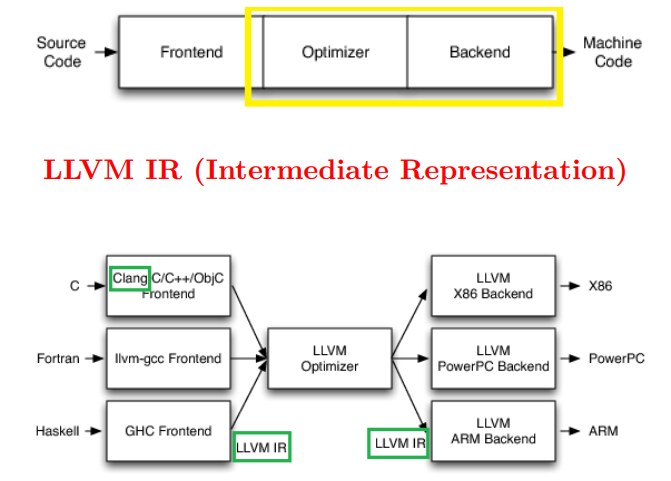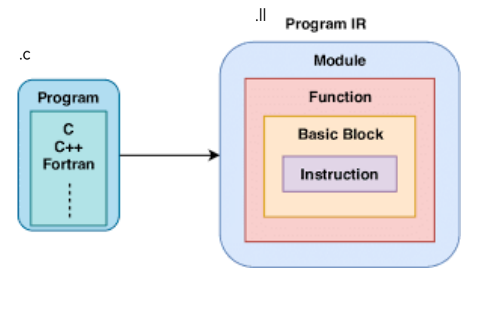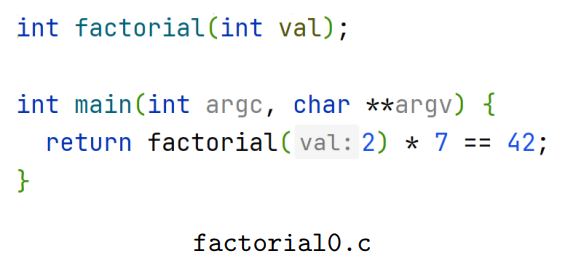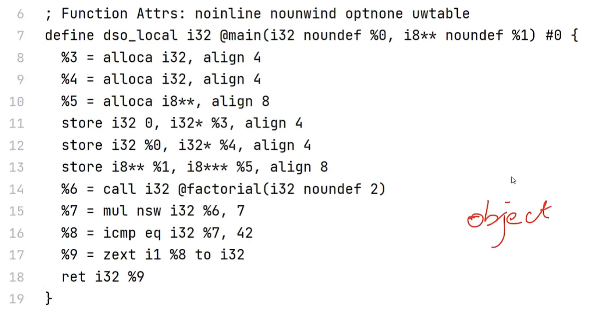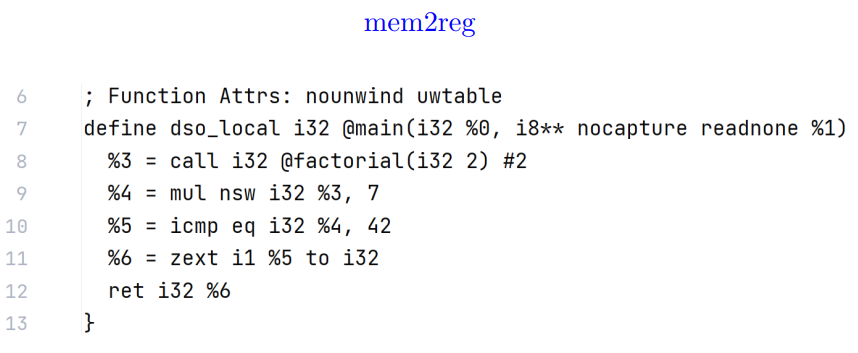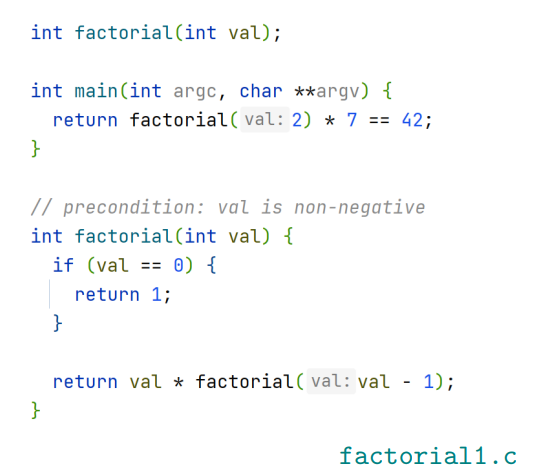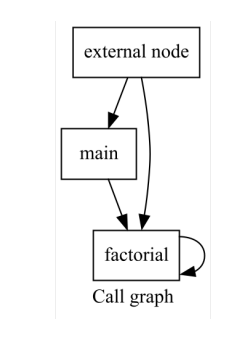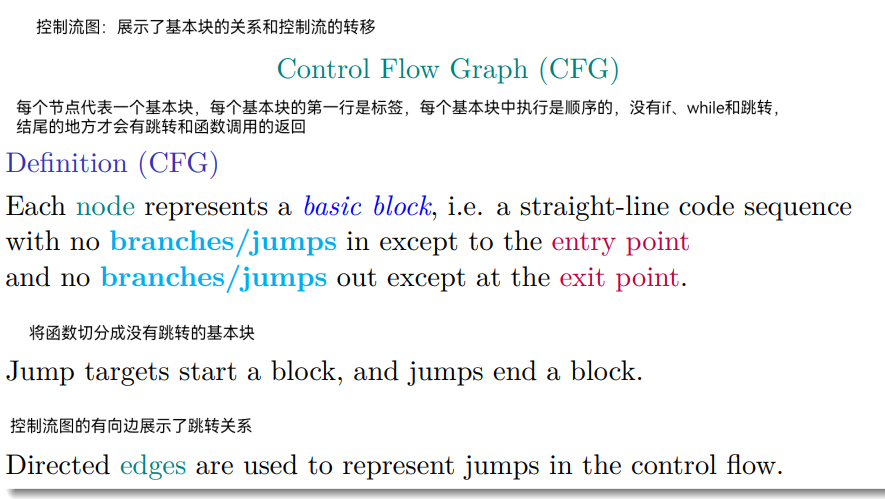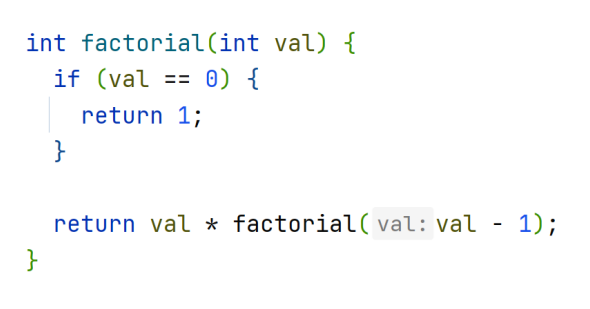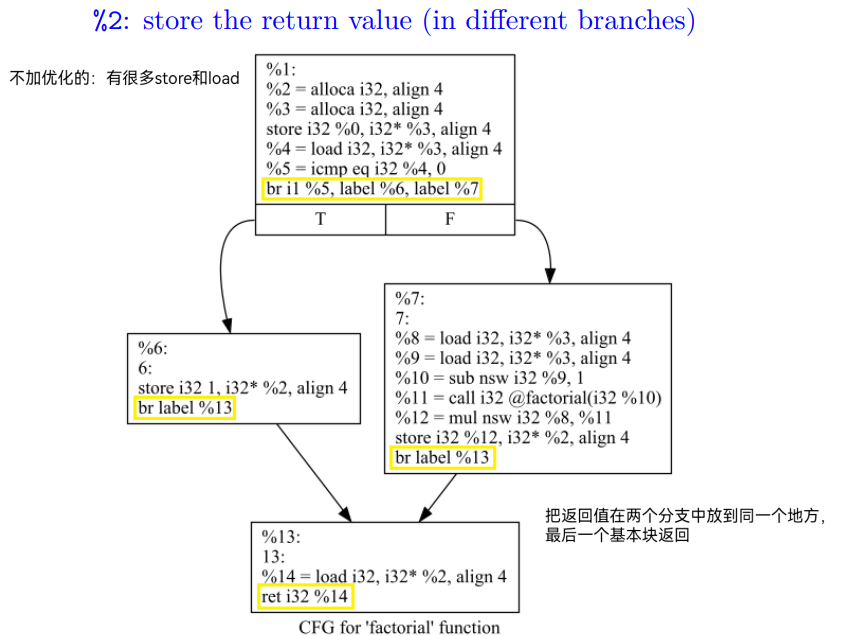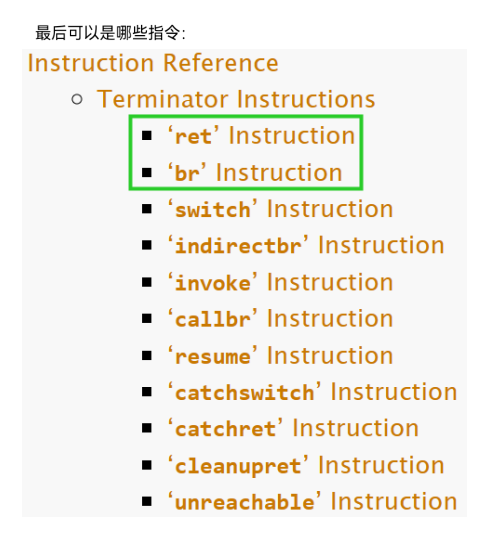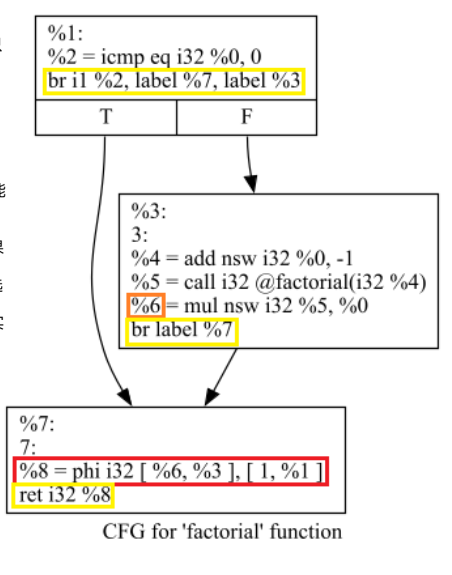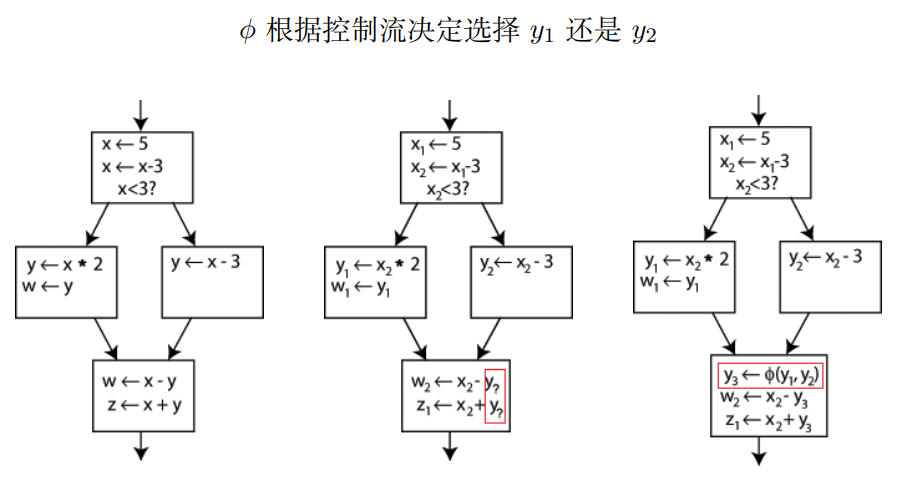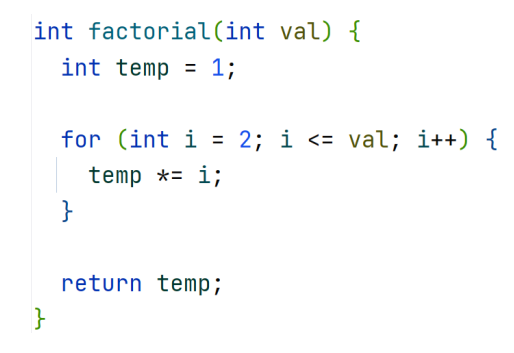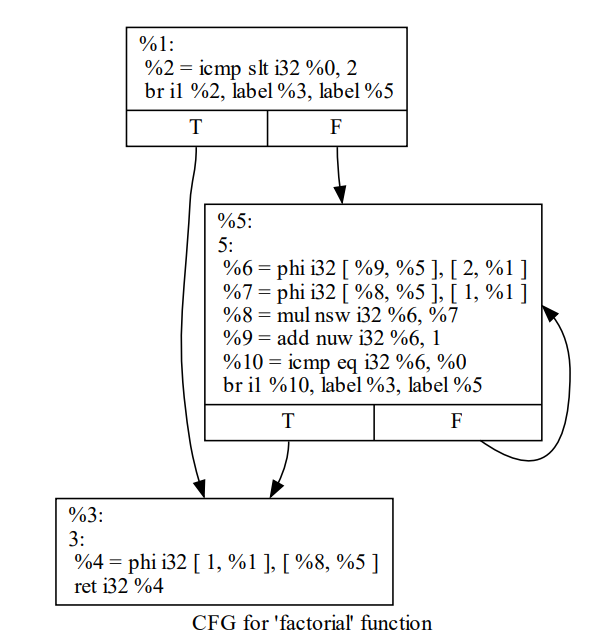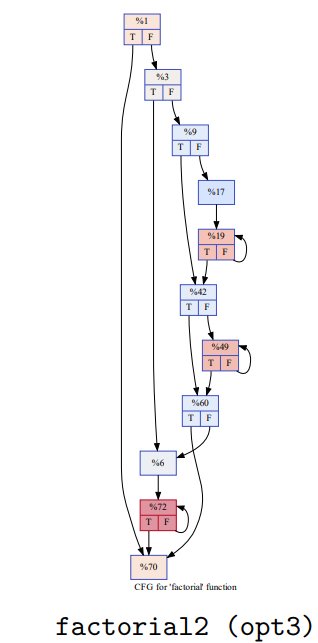1
2
3
4
5
6
7
8
9
10
11
12
13
14
15
16
17
18
19
20
21
22
23
24
25
26
27
28
29
30
31
32
33
34
35
36
37
38
39
40
41
42
43
44
45
46
47
48
49
50
51
52
53
54
55
56
57
58
59
60
61
62
63
64
65
66
67
68
69
70
71
72
73
74
75
76
77
78
79
80
81
82
83
84
85
86
87
88
89
90
91
92
93
94
95
96
97
98
99
100
101
102
103
104
105
106
107
108
109
110
111
112
113
114
115
116
117
118
119
120
121
122
123
124
125
126
127
128
129
130
131
132
133
134
135
136
137
138
139
140
141
142
143
144
145
146
147
148
149
150
151
152
153
154
155
156
157
158
159
160
161
162
163
164
165
166
167
168
169
170
171
172
173
174
175
176
177
178
179
180
181
182
183
184
185
186
187
188
189
190
191
192
193
194
195
196
197
198
199
200
201
202
203
204
205
206
207
208
209
210
211
212
213
214
215
216
217
218
219
220
221
222
223
224
225
226
227
228
229
230
| package llvm.factorial;
import org.bytedeco.javacpp.Pointer;
import org.bytedeco.javacpp.PointerPointer;
import org.bytedeco.llvm.LLVM.*;
import static org.bytedeco.llvm.global.LLVM.*;
public class Factorial1 {
static void factorial1opt0() {
LLVMInitializeCore(LLVMGetGlobalPassRegistry());
LLVMLinkInMCJIT();
LLVMInitializeNativeAsmPrinter();
LLVMInitializeNativeAsmParser();
LLVMInitializeNativeTarget();
LLVMContextRef context = LLVMContextCreate();
LLVMModuleRef module = LLVMModuleCreateWithNameInContext("factorial1", context);
LLVMBuilderRef builder = LLVMCreateBuilderInContext(context);
LLVMTypeRef i32Type = LLVMInt32TypeInContext(context);
LLVMTypeRef i8Type = LLVMInt8TypeInContext(context);
LLVMTypeRef i8ArrayType = LLVMPointerType(i8Type, 0);
LLVMTypeRef i8ArrayArrayType = LLVMPointerType(i8ArrayType, 0);
LLVMValueRef zero = LLVMConstInt(i32Type, 0, 0);
LLVMValueRef one = LLVMConstInt(i32Type, 1, 0);
PointerPointer<Pointer> mainParamTypes = new PointerPointer<>(2)
.put(0, i32Type)
.put(1, i8ArrayArrayType);
PointerPointer<Pointer> factorialParamTypes = new PointerPointer<>(1)
.put(0, i32Type);
LLVMTypeRef mainRetType = LLVMFunctionType(i32Type, mainParamTypes, 2, 0);
LLVMTypeRef factorialRetType = LLVMFunctionType(i32Type, factorialParamTypes, 1, 0);
LLVMValueRef mainFunction = LLVMAddFunction(module, "main", mainRetType);
LLVMValueRef factorialFunction = LLVMAddFunction(module, "factorial", factorialRetType);
LLVMBasicBlockRef mainEntry = LLVMAppendBasicBlock(mainFunction, "");
LLVMPositionBuilderAtEnd(builder, mainEntry);
LLVMValueRef arg1 = LLVMGetParam(mainFunction, 0);
LLVMValueRef arg2 = LLVMGetParam(mainFunction, 1);
LLVMValueRef alloca1 = LLVMBuildAlloca(builder, i32Type, "");
LLVMValueRef alloca2 = LLVMBuildAlloca(builder, i32Type, "");
LLVMValueRef alloca3 = LLVMBuildAlloca(builder, i8ArrayArrayType, "");
LLVMBuildStore(builder, zero, alloca1);
LLVMBuildStore(builder, arg1, alloca2);
LLVMBuildStore(builder, arg2, alloca3);
PointerPointer<Pointer> argsv1 = new PointerPointer<>(1)
.put(0, LLVMConstInt(i32Type, 2, 0));
LLVMValueRef call1 = LLVMBuildCall(builder, factorialFunction, argsv1, 1, "");
LLVMValueRef mul1 = LLVMBuildMul(builder, call1, LLVMConstInt(i32Type, 7, 0), "");
LLVMValueRef icmp1 = LLVMBuildICmp(builder, LLVMIntEQ, mul1, LLVMConstInt(i32Type, 42, 0), "");
LLVMValueRef zext1 = LLVMBuildZExt(builder, icmp1, i32Type, "");
LLVMBuildRet(builder, zext1);
LLVMBasicBlockRef factorialEntry = LLVMAppendBasicBlock(factorialFunction, "");
LLVMPositionBuilderAtEnd(builder, factorialEntry);
LLVMValueRef arg3 = LLVMGetParam(factorialFunction, 0);
LLVMValueRef alloca4 = LLVMBuildAlloca(builder, i32Type, "");
LLVMValueRef alloca5 = LLVMBuildAlloca(builder, i32Type, "");
LLVMBuildStore(builder, arg3, alloca5);
LLVMValueRef load1 = LLVMBuildLoad(builder, alloca5, "");
LLVMValueRef icmp2 = LLVMBuildICmp(builder, LLVMIntEQ, load1, zero, "");
LLVMBasicBlockRef entry1 = LLVMAppendBasicBlock(factorialFunction, "");
LLVMBasicBlockRef entry2 = LLVMAppendBasicBlock(factorialFunction, "");
LLVMBasicBlockRef entry3 = LLVMAppendBasicBlock(factorialFunction, "");
LLVMBuildCondBr(builder, icmp2, entry1, entry2);
LLVMPositionBuilderAtEnd(builder, entry1);
LLVMBuildStore(builder, one, alloca4);
LLVMBuildBr(builder, entry3);
LLVMPositionBuilderAtEnd(builder, entry2);
LLVMValueRef load2 = LLVMBuildLoad(builder, alloca5, "");
LLVMValueRef load3 = LLVMBuildLoad(builder, alloca5, "");
LLVMValueRef sub1 = LLVMBuildSub(builder, load3, one, "");
PointerPointer<Pointer> argsv2 = new PointerPointer<>(1)
.put(0, sub1);
LLVMValueRef call2 = LLVMBuildCall(builder, factorialFunction, argsv2, 1, "");
LLVMValueRef mul2 = LLVMBuildMul(builder, load2, call2, "");
LLVMBuildStore(builder, mul2, alloca4);
LLVMBuildBr(builder, entry3);
LLVMPositionBuilderAtEnd(builder, entry3);
LLVMValueRef load4 = LLVMBuildLoad(builder, alloca4, "");
LLVMBuildRet(builder, load4);
LLVMDumpModule(module);
}
static void factorial1opt1() {
LLVMInitializeCore(LLVMGetGlobalPassRegistry());
LLVMLinkInMCJIT();
LLVMInitializeNativeAsmPrinter();
LLVMInitializeNativeAsmParser();
LLVMInitializeNativeTarget();
LLVMContextRef context = LLVMContextCreate();
LLVMModuleRef module = LLVMModuleCreateWithNameInContext("factorial1", context);
LLVMBuilderRef builder = LLVMCreateBuilderInContext(context);
LLVMTypeRef i32Type = LLVMInt32TypeInContext(context);
LLVMTypeRef i8Type = LLVMInt8TypeInContext(context);
LLVMTypeRef i8ArrayType = LLVMPointerType(i8Type, 0);
LLVMTypeRef i8ArrayArrayType = LLVMPointerType(i8ArrayType, 0);
LLVMValueRef zero = LLVMConstInt(i32Type, 0, 0);
LLVMValueRef one = LLVMConstInt(i32Type, 1, 0);
PointerPointer<Pointer> mainParamTypes = new PointerPointer<>(2)
.put(0, i32Type)
.put(1, i8ArrayArrayType);
PointerPointer<Pointer> factorialParamTypes = new PointerPointer<>(1)
.put(0, i32Type);
LLVMTypeRef mainRetType = LLVMFunctionType(i32Type, mainParamTypes, 2, 0);
LLVMTypeRef factorialRetType = LLVMFunctionType(i32Type, factorialParamTypes, 1, 0);
LLVMValueRef mainFunction = LLVMAddFunction(module, "main", mainRetType);
LLVMValueRef factorialFunction = LLVMAddFunction(module, "factorial", factorialRetType);
LLVMBasicBlockRef mainEntry = LLVMAppendBasicBlock(mainFunction, "");
LLVMPositionBuilderAtEnd(builder, mainEntry);
PointerPointer<Pointer> argsv1 = new PointerPointer<>(1)
.put(0, LLVMConstInt(i32Type, 2, 0));
LLVMValueRef call1 = LLVMBuildCall(builder, factorialFunction, argsv1, 1, "");
LLVMValueRef mul1 = LLVMBuildMul(builder, call1, LLVMConstInt(i32Type, 7, 0), "");
LLVMValueRef icmp1 = LLVMBuildICmp(builder, LLVMIntEQ, mul1, LLVMConstInt(i32Type, 42, 0), "");
LLVMValueRef zext1 = LLVMBuildZExt(builder, icmp1, i32Type, "");
LLVMBuildRet(builder, zext1);
LLVMBasicBlockRef factorialEntry = LLVMAppendBasicBlock(factorialFunction, "");
LLVMPositionBuilderAtEnd(builder, factorialEntry);
LLVMValueRef arg3 = LLVMGetParam(factorialFunction, 0);
LLVMValueRef icmp2 = LLVMBuildICmp(builder, LLVMIntEQ, arg3, zero, "");
LLVMBasicBlockRef entry1 = LLVMAppendBasicBlock(factorialFunction, "");
LLVMBasicBlockRef entry2 = LLVMAppendBasicBlock(factorialFunction, "");
LLVMBuildCondBr(builder, icmp2, entry2, entry1);
LLVMPositionBuilderAtEnd(builder, entry1);
LLVMValueRef add1 = LLVMBuildAdd(builder, arg3, LLVMConstInt(i32Type, -1, 0), "");
PointerPointer<Pointer> argsv2 = new PointerPointer<>(1)
.put(0, add1);
LLVMValueRef call2 = LLVMBuildCall(builder, factorialFunction, argsv2, 1, "");
LLVMValueRef mul2 = LLVMBuildMul(builder, call2, arg3, "");
LLVMBuildBr(builder, entry2);
LLVMPositionBuilderAtEnd(builder, entry2);
LLVMValueRef phi1 = LLVMBuildPhi(builder, i32Type, "");
PointerPointer<Pointer> phiValues = new PointerPointer<>(2)
.put(0, mul2)
.put(1, one);
PointerPointer<Pointer> phiBlocks = new PointerPointer<>(2)
.put(0, entry1)
.put(1, factorialEntry);
LLVMAddIncoming(phi1, phiValues, phiBlocks, 2);
LLVMBuildRet(builder, phi1);
LLVMDumpModule(module);
}
public static void main(String[] args) {
factorial1opt0();
factorial1opt1();
}
}
|
